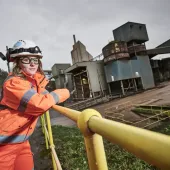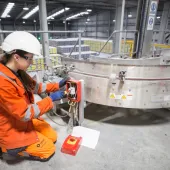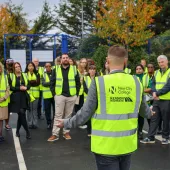New Technical Qualifications - What Are They?

First published in the January 2018 issue of Quarry Management as Put the kettle on, T-Levels are coming
Dave Underhill, project co-ordinator for Inspiring Futures, outlines what these new technical qualifications will mean for the industry
Technical Levels, colloquially known as T-Levels, are the biggest reform to hit the English education system in 70 years.1 Due to come into effect in 2020, the goal of these new technical qualifications is to ‘bring... training for young people and adults in line with the needs of business and industry’2 and to increase the number of young people who embark on a technical education.
This new system will replace the current range of around 20,000 qualifications that are presently being run by some 160 organizations, with 15 vocational ‘routes’ for students to choose from. Each route will take two years to complete and the overall goal is to present students with two clear choices: the academic route (A-levels and Degree) or the technical route (T-Levels), with bridging courses promised at 18+. Each of these routes will be delivered through college- and/or employment-based education. There will be a reliance on apprenticeships, with four of the 15 routes primarily being delivered this way. The remaining ‘college-based’ programmes have initially been assigned to new trailblazer apprenticeship groups and are presently under development, within which MP Futures has already succeeded in establishing its first sector-specific apprenticeship.
So, what does this mean practically? Every 16–18-year-old on a technical programme will be entitled to a ‘quality’ work placement; anticipated to be around 250,000 students a year. Although the details remain vague, these work placements are seen as the lynchpin to the success of these new qualifications. Far from the old work-experience model, these will be well-structured and long-term placements, anticipated to last at least two to three months pro rata. Whilst the nature of these will be route dependant, they must be occupationally specific and focused on developing the practical technical skills for the profession or trade that the student is studying. It is considered vital that they will be locally brokered between employers and providers, and they must be delivered to a structured work plan with clearly agreed objectives. This aspect of the new qualifications is potentially problematic for our sector given the health and safety concerns and the stringent requirements of insurers. However, there are many careers within our sector that do offer potential, and these must not be dismissed out of hand, especially considering the well-documented connection between work experience and future career choices.3
Whilst this new system is currently still in its infancy, it is quickly gathering pace, with the Institute for Apprenticeships seeking employers, both large and small, colleges and training providers to shape and lead the agenda for each route. Crucially, standards will be designed by considering the needs of skilled employment and working backwards, with only high-quality technical qualifications that match employer-set standards being approved. Employers will ensure that the day-to-day training individuals receive genuinely meets the needs of industry. Clearly, this hinges on a close integration of college- and employment-based education and thus between colleges and employers. Although it shall remain the sole responsibility of the Institute for Apprenticeships to decide on the specifics of the process, employers of all sizes are going to have to engage.
These new routes have the potential to drastically increase the uptake in technical education. However, the extractives and mineral processing sector is conspicuous by its absence, being placed in the ‘Engineering & Manufacturing’ route. However, this will be an excellent opportunity not just to upskill our future workforce, but also to work alongside other industries within the engineering and manufacturing, and construction routes to increase the talent base we can tap into. If we can embrace the challenge of T-Levels and provide demanding, quality work placements, then we can inspire students to actively want to join our industry and be part of supporting the future of UK infrastructure.
References
- www.bbc.co.uk/newsbeat/article/39212506/t-levels-what-are-they
- BOLES, N., 2016, Foreword by the Minister of State for Skills, In: Department of Education Post-16 Skills Plan
- Education Select Committee, 2013, Written Evidence Submitted by Ofsted: Commons Select Committee – Education. Available Online: publications.parliament.uk/pa/cm201213/cmselect/cmeduc/632/632vw42.htm
- Subscribe to Quarry Management, the monthly journal for the mineral products industry, to read articles before they appear on Agg-Net.com








